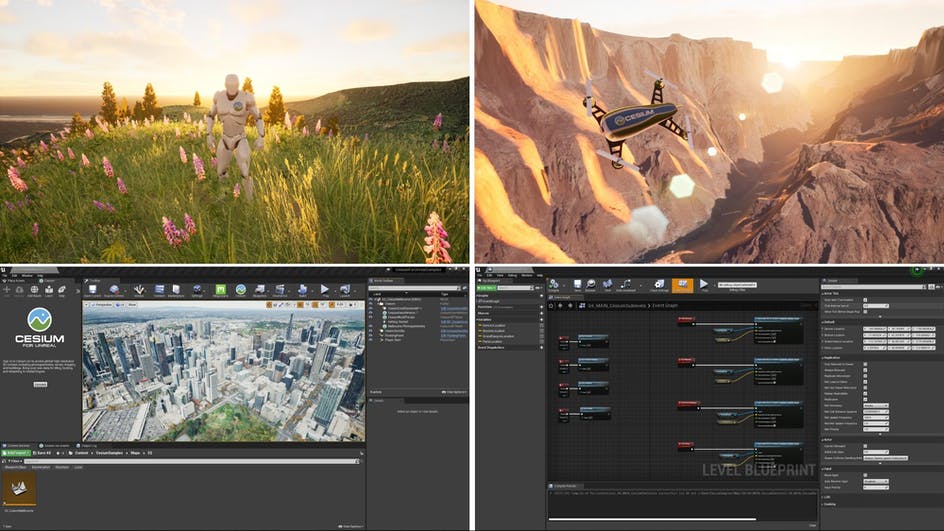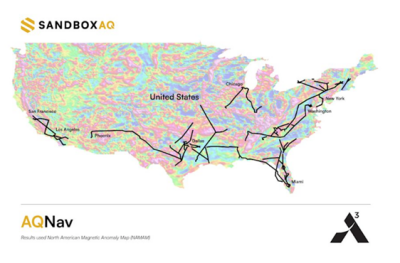In collaboration with Epic Games, Cesium has announced Cesium for Unreal, a free, open-source plugin that delivers high-resolution 3D geospatial technology and accurate real-world data for any type of application.
Cesium for Unreal is an accurate, full-scale virtual globe for Unreal Engine. It enables developers to create global-scale interactive digitized worlds with real-world 3D location data, such as the kind captured by drones, satellites, and intelligent machines.
Bringing 3D and geospatial together
Cesium’s open platform for 3D development has provided the foundation for software applications that want to use geospatial data. Vocally committed to openness and interoperability, Cesium is the glue that holds a lot of spatial applications together, and has been applied to industries across AEC, aerospace, energy, commercial real estate, smart cities, autonomous driving and more. In their latest announcement, they’ve turned their sights to working with another growing application: Epic Games’ Unreal Engine.
Game engine developers have seen rapid growth as they are pushed to find ways to deliver high-resolution, realistic 3D content as fast and as seamlessly as possible. Bringing the geospatial piece – where Cesium has expertise – into Unreal’s powerful engine may usher in a new era of ultra accurate geospatial models delivered at scale, says Patrick Cozzi, Cesium CEO.
“At Cesium, we’ve long believed in the potential for innovation at the intersection of the 3D geospatial and computer graphics ecosystems. Cesium for Unreal is a monumental step in bridging decades of advancements in these technologies.”
Cesium for Unreal enables a high-accuracy full-scale (WGS84) globe in Unreal Engine, the open and advanced real-time 3D tool from Epic Games. With this new plugin, developers now have the ability to create interactive, virtual worlds using accurate real-world 3D content captured from cameras and LIDAR sensors on satellites, drones, and intelligent machines.
Onward to the metaverse?
This move is one that is seen as facilitating the development of a metaverse – a sort of “second world” that is built on a copy of our own, where content can be created and interacted with virtually. The new Cesium for Unreal plugin is a first step toward a future where immersive, global-scale 3D applications with pinpoint precision are ubiquitous across industries.
“Cesium’s expertise in cloud-based geospatial software applications and leadership on open standards for streaming massive 3D content makes them an ideal partner to support Epic’s vision for an open Metaverse,” said Marc Petit, VP and General Manager of Unreal Engine at Epic Games.
The implementation of 3D geospatial technology in real-world environments — from building immersive experiences in artist-created scenes to those based on 3D content in its precise geospatial location — represents a shift in industries including training and simulation; architecture, engineering, and construction (AEC); automotive and transportation; film and television; broadcast and live events; and games.
“For the last decade, Cesium has brought graphics and game engine techniques to 3D geospatial via the CesiumJS WebGL engine and surrounding platform. Today we are adding the reverse; we are bringing 3D geospatial to Unreal Engine,” said Cozzi in a blog post reflecting on the announcement.
“We live in an exciting time of ubiquitous sensors capturing the real world; drones and autonomous vehicles carrying sensors; photogrammetry and AI algorithms creating semantic 3D models; data explosion in resolution and collection frequency; plentiful cloud compute and storage; AR and VR devices coming of age; 5G bandwidth on the rise; GPUs that rival past supercomputers; and cell phones that rival yesteryear’s laptops. My prediction is that the dividing line between the physical and digital worlds will continue to blur, as will the line between 3D geospatial and game assets and ecosystems… I won’t be a graphics programmer in geospatial; I will just be a programmer.”
Cesium for Unreal is available to download for free on the Unreal Engine Marketplace. It includes integration with Cesium ion for optional commercial access to curated 3D content like global terrain, 3D buildings, photogrammetry, and satellite imagery, and software to convert custom high-resolution 3D data into streamable 3D Tiles.






